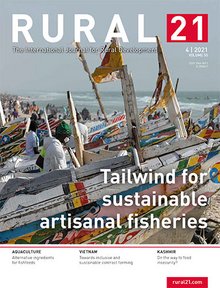Vol. 55 No. 4/2021: Tailwind for sustainable artisanal fisheries

Global fish stocks have never before been under as much stress as they are today. And never before have so many aquatic species been heading for extinction, with more than a third of fish stocks being fished at biologically unsustainable levels – a share that, according to Food and Agriculture Organization figures, has tripled in the last 40 years. This poor state of our natural resources has also once again been highlighted at the recent UN Biodiversity Conference (COP 15) in Kunming, China – accompanied by demands to place at least a third of our marine areas under protection.
However, almost 3.3 billion people, most of them living in Africa and Asia, rely on fish for their daily supply of protein. Moreover, fish and seafood secure the livelihoods of about 800 million people worldwide, 90 per cent of whom are living in developing countries. For many of these countries, fish trade and the granting of fishing rights represent an indispensable source of income – in fact, alongside tourism, the only source for most small island development states. But so far, the crucial role the sector plays has hardly been reflected by international development cooperation.
Nevertheless, small-scale fishers and fish farmers are by no means per se the custodians of our aquatic resources, either. They all too often apply unsustainable production methods – for lack of knowledge or owing to insufficient technical equipment, but increasingly because factors such as the impacts of climate change or industrial fishing are forcing them to give up their traditional modes of production or extend their fishing grounds.
It is for this reason too that the United Nations has declared 2022 the International Year of Artisanal Fisheries and Aquaculture (IYAFA) – a move which is to help get the sector out of marginalisation and highlight the importance of small-scale aquatic food production for food security and nutrition, for employment and income generation and hence for poverty eradication. But above all, it is to help place the sector on more sustainable pillars and make it viable for coming generations. In this edition, we present initiatives which have been committed to this goal for many years.
Click here if you are interested to subscribe
Download edition 2021/04 Focus: "Tailwind for sustainable artisanal fisheries" as PDF
Focus
- Global Fisheries – still a blind spot in international cooperation
- Small in size – big in value. Celebrating small-scale artisanal fisheries and aquaculture in 2022
- Thinking terrestrial and aquatic food systems together
- Boosting transdisciplinary research for small-scale fisheries
- More aquaculture to feed the world? Not at the expense of African fishing communities
- Sustainable fisheries need transparency
- "We have nothing to hide, but everything to share"
- Fish Forever – community-led solutions to solve coastal overfishing
- "Certification is not an end in itself"



